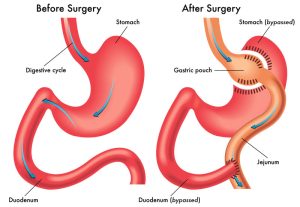Gastric Bypass Surgery
Gastric bypass surgery is a weight loss procedure that involves creating a small stomach pouch and rerouting a portion of the small intestine. This surgery aims to effectively reduce the capacity of the stomach and alter the digestive process, leading to significant weight loss for individuals who have been unsuccessful with other weight loss methods.
During the procedure, the surgeon divides the stomach to create a small upper section, called a pouch. This pouch restricts the amount of food that can be consumed, resulting in a feeling of fullness with smaller portions. The surgeon then reroutes a section of the small intestine, connecting it to the newly created pouch. This bypasses a larger part of the stomach and the upper portion of the small intestine, reducing the absorption of calories and nutrients.

Gastric bypass surgery is usually performed under general anesthesia and typically requires a hospital stay of 2-3 days. Recovery time varies, but most patients can resume their daily activities within a few weeks. It is important to note that successful weight loss and maintenance after the surgery require significant lifestyle changes, including adopting a healthier diet and engaging in regular physical activity.
This procedure can lead to significant weight loss, with many patients experiencing a loss of 60-80% of their excess body weight within the first year after surgery. Additionally, gastric bypass surgery has been shown to improve or resolve obesity-related conditions such as type 2 diabetes, high blood pressure, and sleep apnea.
However, like any surgical procedure, gastric bypass surgery carries potential risks and complications. These can include infection, bleeding, blood clots, vitamin deficiencies, and issues related to the surgical connections created during the procedure. It is vital for patients to have a thorough understanding of the potential risks and benefits associated with gastric bypass surgery, as well as realistic expectations for post-operative outcomes. Psychological counseling and support are often an important part of the preparation and recovery process.
